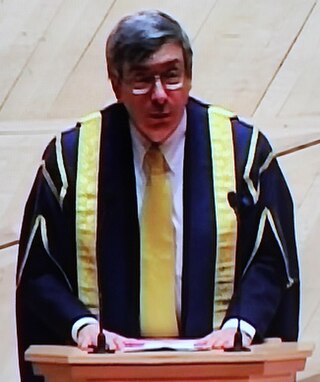
The Institute for Fiscal Studies (IFS) is an independent economic research institute based in London, United Kingdom, which specialises in UK taxation and public policy. It produces both academic and policy-related findings.

The Wellcome Trust is a charitable foundation focused on health research based in London, United Kingdom. It was established in 1936 with legacies from the pharmaceutical magnate Henry Wellcome to fund research to improve human and animal health. The aim of the Trust is to "support science to solve the urgent health challenges facing everyone." It had a financial endowment of £29.1 billion in 2020, making it the fourth wealthiest charitable foundation in the world. In 2012, the Wellcome Trust was described by the Financial Times as the United Kingdom's largest provider of non-governmental funding for scientific research, and one of the largest providers in the world. According to their annual report, the Wellcome Trust spent GBP £1.1 billion on charitable activities across their 2019/2020 financial year. According to the OECD, the Wellcome Trust's financing for 2019 development increased by 22% to US$327 million.

Sir Richard Hughes Trainor,, is a retired academic administrator and historian. He served as the Vice-Chancellor of the University of Greenwich from 2000 to 2004, the Principal and latterly also president of King's College London from 2004 to 2014, and the Rector of Exeter College, University of Oxford between 2014 and 2024.

The Cambridge Biomedical Campus is the largest centre of medical research and health science in Europe. The site is located at the southern end of Hills Road in Cambridge, England.

University Alliance (UA) is an association of British universities formed in 2006 as the Alliance of Non-Aligned Universities, adopting its current name in 2007.

The Wellcome Genome Campus is a scientific research campus built in the grounds of Hinxton Hall, Hinxton in Cambridgeshire, England.
The Nuffield Trust, formerly the Nuffield Provincial Hospitals Trust, is a charitable trust with the mission of improving health care in the UK through evidence and analysis.
Alastair Buchan is a British neurologist and researcher in stroke medicine. His main research interest is how to make neuroprotection a reality in the clinic. From October 2008 until January 2017, he served as the Dean of Medicine and the Head of the Medical Sciences Division, University of Oxford. He currently holds the Chair of Stroke Research at the University of Oxford.
The Nuffield Council on Bioethics is a UK-based independent charitable body, which examines and reports on bioethical issues raised by new advances in biological and medical research. Established in 1991, the Council is funded by the Nuffield Foundation, the Medical Research Council and the Wellcome Trust. The Council has been described by the media as a 'leading ethics watchdog', which 'never shrinks from the unthinkable'.
Y Touring Theatre Company was a national touring theatre company which produced original plays and debates exploring contemporary issues. It was founded in 1989 by Nigel Townsend. The company was based in Kings Cross, London, England and was a former operation of Central YMCA.

The UCL Great Ormond Street Institute of Child Health (ICH) is an academic department of the Faculty of Population Health Sciences of University College London (UCL) and is located in London, United Kingdom. It was founded in 1946 and together with its clinical partner Great Ormond Street Hospital (GOSH), forms the largest concentration of children's health research in Europe. In 1996 the Institute merged with University College London. Current research focusses on broad biomedical topics within child health, ranging from developmental biology, to genetics, to immunology and epidemiology.

The Wellcome Centre for Human Genetics is a human genetics research centre of the Nuffield Department of Medicine in the Medical Sciences Division, University of Oxford, funded by the Wellcome Trust among others.
The various academic faculties, departments, and institutes of the University of Oxford are organised into four divisions, each with its own Head and elected board. They are the Humanities Division; the Social Sciences Division; the Mathematical, Physical and Life Sciences Division; and the Medical Sciences Division.
Anna Frances Vignoles is a British educationalist and economist. She is the Director of the Leverhulme Trust, taking up her position in January 2021. Previously, she was Professor of Education and fellow of Jesus College at the University of Cambridge, where her research focused on the economic value of education and issues of equity in education. She was elected as a fellow of the British Academy in 2017.
Sarah Elizabeth Lamb is the Pro-Vice-Chancellor and Executive Dean of the Faculty of Health and Life Sciences at the University of Exeter, and the Mireille Gillings Professor for Health Innovation. She is also an Honorary Departmental Professor at the Nuffield Department of Medicine, University of Oxford and was the Foundation Director of the Oxford Clinical Trials Research Unit.
Mary Dixon-Woods is a social scientist who researches quality and safety in healthcare. She is a professor of healthcare improvement studies at the department of public health and primary care at the University of Cambridge, where she is also director of the Healthcare Improvement Studies Institute, and a fellow of Homerton College, Cambridge. Dixon-Woods was the co-editor-in-chief of BMJ Quality & Safety from 2011 to 2020.

Hetan Shah is the chief executive of the British Academy and the chair of Our World in Data. In 2024 he was appointed by the UK Parliament to the Board of the National Audit Office, the UK's spending watchdog. He is a visiting professor at King's College London and a Fellow of Birkbeck, University of London. He served as executive director of the Royal Statistical Society from 2011 to 2019.
Russell Mardon Viner, FMedSci is an Australian-British paediatrician and policy researcher who is Chief Scientific Advisor at the Department for Education and Professor of Adolescent Health at the UCL Great Ormond Street Institute of Child Health. He is an expert on child and adolescent health in the UK and internationally. He was a member of the UK Government's Scientific Advisory Group for Emergencies (SAGE) during the COVID-19 pandemic and was President of the Royal College of Paediatrics and Child Health from 2018 to 2021. He remains clinically active, seeing young people with diabetes each week at UCL Hospitals. Viner is vice-chair of the NHS England Transformation Board for Children and Young People and Chair of the Stakeholder Council for the Board. He is a non-executive director (NED) at Great Ormond St. Hospital for Children NHS Foundation Trust, also sitting on the Trust's Finance & Investment and the Quality and Safety sub-committees.
Sir Martin Jonathan Landray is a British physician, epidemiologist and data scientist who serves as a Professor of Medicine & Epidemiology at the University of Oxford. Landray designs, conducts and analyses large-scale randomised control trials; including practice-changing international trials that have recruited over 100,000 individuals. Landray previously led the health informatics team that enabled the collection and management of data for the UK Biobank on over half a million people.
The Centre for Genomic Pathogen Surveillance is a computational genomics research institute in Oxfordshire.








